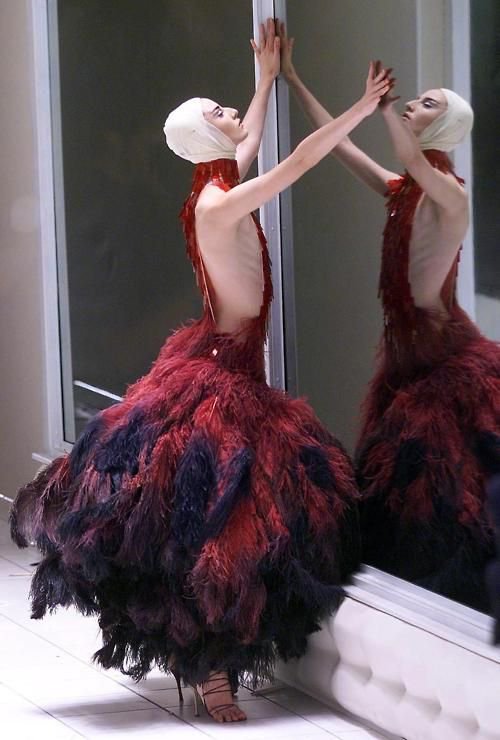Fashion's troubled fascination with Mental Health
TW: suicide mentions, mentions of mental health and mental health disorders
You would think after numerous scandals and problematic runway shows that Gucci would be cautious. But no, the Italian powerhouse has struck out yet again. Gucci’s spring/summer 2020 show began with models coming off a conveyor belt dressed in an all-white uniform reminiscent of straight jackets. The fashion show set didn’t help and added to the illusion of a psychiatric ward; sparse walls painted a stark white, a runway enclosed with glass and bright, clinical white lights from above. An unsettling sight for all but especially upsetting to the proportion of the population that suffers from mental illness.
Model Ayesha Tan Jones who has previously been diagnosed with severe anxiety and depression was strongly against presenting mental health as a fashion moment, and silently protested the depiction of the same, on the Gucci catwalk by holding up her hands to reveal the message “Mental Health is not Fashion”.
Image: Bustle
On her Instagram Ayesha stated “Straitjackets are a symbol of a cruel time in medicine when mental illness was not understood, and people’s rights and liberties were taken away from them, while they were abused and tortured in the institution. It is in bad taste for Gucci to use the imagery of straitjackets and outfits alluding to mental patients, while being rolled out on a conveyor belt as if they were a piece of factory meat.” This is however not the first time a fashion house has fetishized mental illness; Burberry was criticized in the recent past for showcasing a hoodie that featured a noose in its autumn/winter 2019 show. The brand has since issued an apology and stopped production on the hoodie, but the incident further pokes at the fact that mental health is just another prop in the fashion industry.
The Alexander McQueen spring/summer 2001 show titled Voss is another instantly recognisable show that references and I would argue even romanticizes mental illness. The set mimicked a padded cell in an asylum with tiled floors and surveillance mirrors. The models danced across the cell, laughed at their own reflection and reflected through movement an unhinged and deranged tone of voice. McQueen cited the show to be nothing more than artistic expression and finding beauty in the madness, the morbid and the ugly. But re-watching it left me with a sense of unease, mental health should be normalized but placing it in a fashion context feels wrong.
Source: Buro 24/7
Mainstream fashion and lifestyle brands such as Skinnydip and Ban.do are merchandising mental illness as well; selling necklaces that spell out the words anxiety and depression in a calligraphic font or T-shirts with ‘I’ve got issues’ plastered across the front in an array of colours. The state of mental health in fashion is poor and there seems to be no repercussions for brands that exploit mental illness for profit. Attempts by high street brands to promote and preach mental health goes down the self-care/self-love route, which funnily enough implies that true wellness and stability is directly related to shopping at said brand.
Fashion and Mental health have a troubled history not just in its portrayal but in its impact. Creative directors at major fashion houses have reported suffering burnout, due to pressure from the wider industry to churn out new collections every other month. Some designers turn to substances to combat mental illness and others quit under the pressure. Alexander McQueen and Kate Spade were on the receiving end of this pressure and suffered from depression and anxiety; taking their own lives as a result.
Fashion insiders are aware of the startling decline in mental health within the industry, but it is rarely mentioned in the press or on social media. You wouldn’t expect something as glamorous and beautiful as fashion to have such a monumental mental health problem, but it does.
Brands like Gucci and Burberry that have an enormous cultural presence should use their social media, marketing and runway shows to speak out about mental health. Acknowledging the reality of mental illness in fashion without making it seem desirable or exploiting it for aesthetic purposes.
By Zara Afthab
(she/her)
Zara is the Fashion and Beauty Editor @ PARDON!
Read more about her on OUR TEAM! page.


